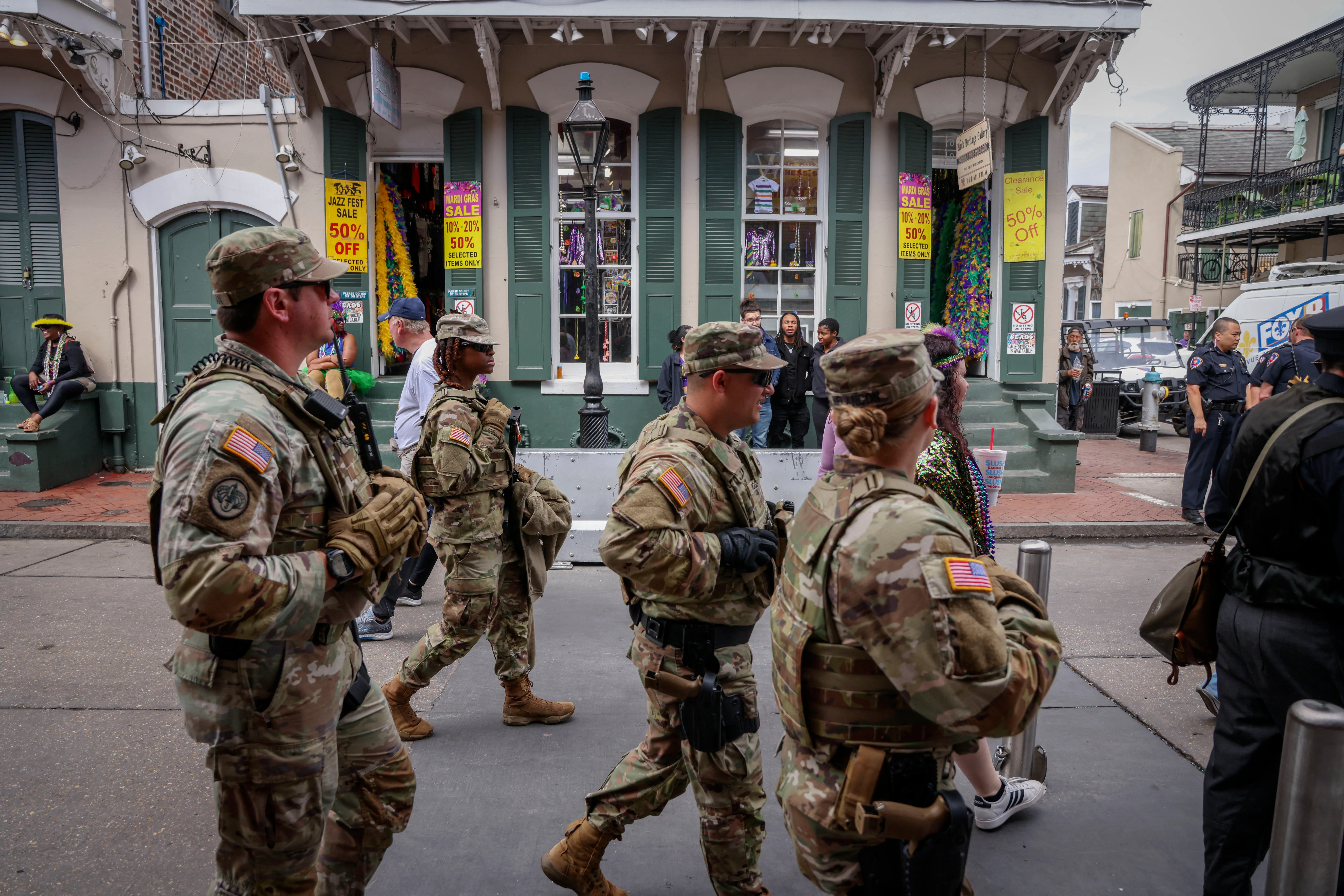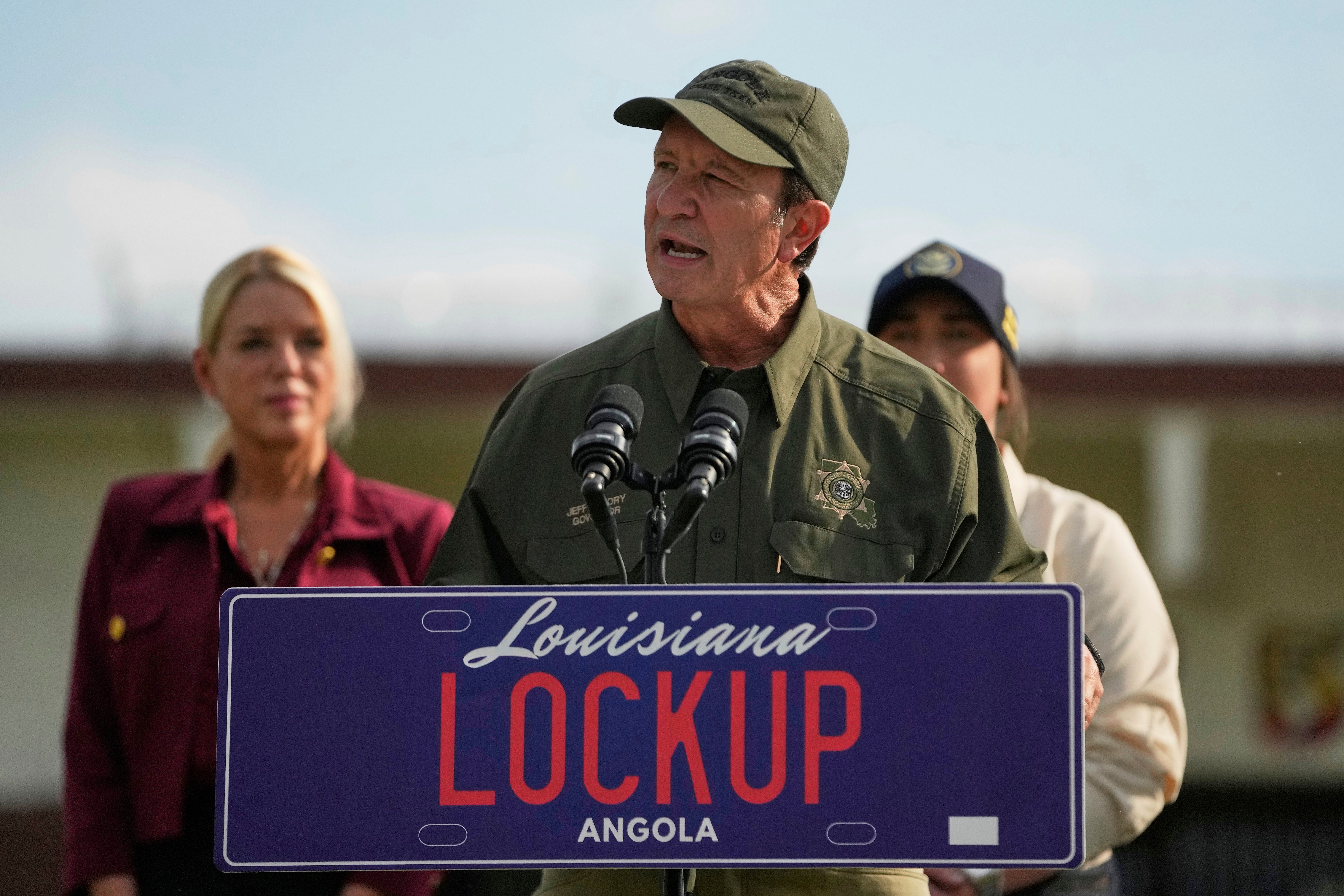Trump may send troops to Democratic-run New Orleans. Republican state leaders are fine with that

Donald Trump is considering sending the National Guard into New Orleans, escalating his threats to deploy federalized troops against cities with Democratic leadership and large Black populations.
But unlike his warnings to Chicago, Los Angeles and Baltimore, New Orleans is a Democratic city in a Republican-controlled state, with a GOP-dominated state legislature and a governor who is staunchly aligned with the president and his agenda.
Democratic officials in New Orleans have condemned the president’s remarks and rejected offers from the White House to put troops on the ground.
But the state’s Republican leaders and members of Congress — most of whom represent constituents far from the Crescent City — are calling on Trump to send in the troops.
“We’re making a determination now,” Trump said from the White House on Wednesday. “Do we go to Chicago or do we go to a place like New Orleans, where we have a great governor, Jeff Landry, who wants us to come in and straighten out a very nice section of this country that’s become, you know, quite tough, quite bad.”
Homicide rates in the city, once considered the nation’s “murder capital,” have plummeted by more than 21 percent compared to last year, mirroring national downward trends alongside increased investments in violence prevention and government services. The city is on pace for a 50-year low in murders.
“So we’re going to be going to maybe Louisiana, and you have New Orleans, which has a crime problem — we’ll straighten that out in about two weeks,” said Trump, echoing his ongoing claim that his administration can seemingly solve any crisis within 14 days.
“It’ll take us two weeks — easier than D.C,” he said. “But we could straighten out Chicago. All they have to do is ask us.”
Landry, a former Republican congressman and state attorney general whom Trump endorsed for governor, quickly welcomed Trump’s offer.
“We’ll take President Trump’s help from New Orleans to Shreveport,” Landry said in a statement.
But “militarizing the streets of New Orleans is not a solution. Period,” said Democratic Rep. Troy Carter, whose district includes New Orleans.
“If the president wants to provide federal resources to the city, I will work with him to provide funding to recruit and better train police officers, better fund our district attorney, fix the infrastructure at Orleans Parish Prison and fund the very programs he has cut that get at the root cause of crime: systemic poverty,” he said in a statement.
“New Orleans needs resources, not a political stunt,” he added.
New Orleans City Council member at-large Helena Moreno, a frontrunner in the city’s mayoral race, called Trump’s remarks an “attack” on cities that have rejected the president’s agenda.
“There are many cities with mayors aligned with this president whose crime issues are severe, but they’re not targeted,” she said in a statement. “That clearly shows that this is about scare tactics and politicizing public safety. Ultimately leading to the misuse of public funds and resources to attempt to score political points.”
New Orleans City Council member at-large JP Morrell called Trump’s remarks “ridiculous.”
“Guardsmen are not trained law enforcement,” he said. “They can’t solve crimes, they can’t interview witnesses and they aren’t trained to constitutionally police.”
In a joint statement, the office of New Orleans Mayor LaToya Cantrell — who is under federal indictment — and the New Orleans Police Department didn’t mention Trump’s threats but noted that the city’s “collaborative approach” with the federal government and state law enforcement has been “instrumental” in combatting crime — suggesting that city leadership does not want another spectacle of National Guard service members patrolling the city’s streets.

Landry had sent the National Guard to New Orleans during the Super Bowl earlier this year, and he deployed dozens of service members from the state to Washington, D.C., to support Trump’s federal takeover last month.
The state’s Republican officials are once again eager for a show of force in the city, heightening the decades-long tension between the GOP and a majority Black, tourist-dense destination city that draws roughly $10 billion a year from visitors.
The state’s Republican attorney general Liz Murrill said “people continue to die in New Orleans because ‘leaders’ refuse to accept the resources that are available to them.”
“If your gut reaction is to reject the president’s offer for assistance without condition, perhaps you’re the problem — not him,” she said.
House Speaker Mike Johnson and House Majority Leader Steve Scalise — among the two most powerful House members, both representing Louisiana — are also urging Trump to send in the guard.
“The citizens of New Orleans, and the millions of tourists who come here, deserve that same level of security,” Scalise said.
“The National Guard in Washington, D.C. demonstrated that more uniforms on the street, whatever the color of the uniform is, makes our community safer,” said Louisiana Senator Bill Cassidy. “It is not a long-term solution, but this gives us a chance to demonstrate that it is just as true in Louisiana as it is in Washington, D.C.”
Any troop deployment into New Orleans is likely to face a legal challenge from city officials — and a federal judge has already ruled that Trump illegally went over the heads of state officials when he sent troops to California.
After the state’s Democratic Governor Gavin Newsom sued the president, a federal judge determined that the president illegally deployed the National Guard to Los Angeles in response to protests against his anti-immigration agenda.
The president’s troop deployment violated the Posse Comitatus Act of 1878, which prohibits the use of the U.S. military for domestic law enforcement, according to the decision from District Judge Charles Breyer.
The judge’s order — in the face of Trump’s plans for what Breyer called “a national police force with the president as its chief” — further blocks the administration from sending troops into the state.
Washington’s attorney general has filed a similar lawsuit alleging Trump violated the same law with his deployment of U.S. troops into the capital city’s streets.
“Deploying the National Guard to engage in law enforcement is not only unnecessary and unwanted, but it is also dangerous and harmful to the District and its residents,” Attorney General Schwalb said Thursday. “No American city should have the U.S. military — particularly out-of-state military who are not accountable to the residents and untrained in local law enforcement — policing its streets … It’s D.C. today but could be any other city tomorrow.”




